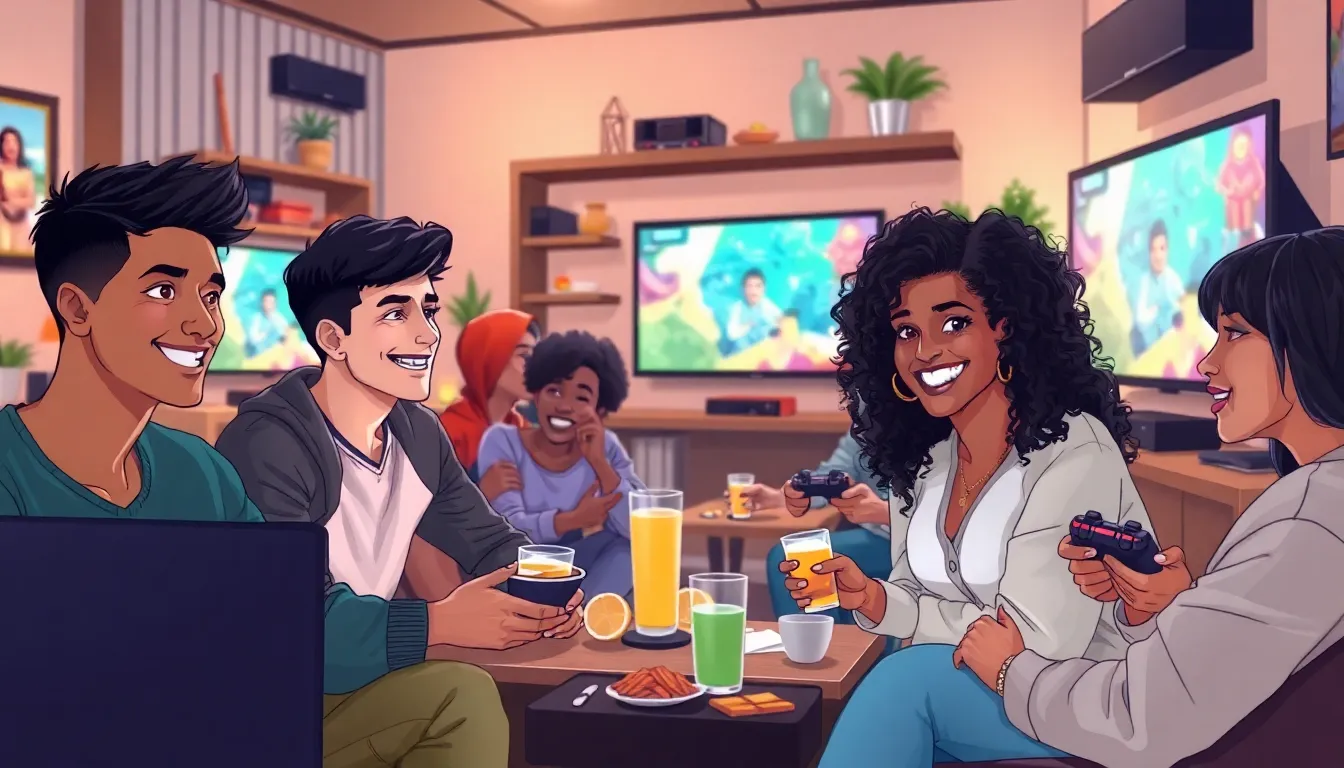In a world where stress levels soar and mental health challenges lurk around every corner, video games have emerged as an unexpected hero. These digital realms offer not just an escape but also a unique way to boost mental well-being. Who knew that defeating pixelated monsters could lead to real-life benefits?
Video Games and Mental Health
Video games play a significant role in influencing mental health. Numerous studies illustrate that gaming fosters a sense of accomplishment and can enhance mood. Players often report feelings of satisfaction after overcoming challenges, which promotes resilience. Engaging with video games can serve as a healthy outlet for stress relief, allowing individuals to immerse themselves in different worlds.
Research from the American Psychological Association indicates that moderate gaming supports cognitive development, improving problem-solving skills. Gamers who connect with others through multiplayer experiences report lower levels of loneliness. Interaction within gaming communities enables players to form social bonds, reducing feelings of isolation.
Certain genres, like role-playing games, encourage creativity and self-expression. Players often create narratives that resonate with their personal experiences, contributing to emotional healing. Additionally, some games are designed explicitly for therapeutic purposes, aiding individuals with conditions such as anxiety and depression.
Balancing gaming time remains essential. Excessive gaming may lead to adverse effects, including social withdrawal and neglect of responsibilities. Monitoring gaming habits ensures players reap the mental health benefits while avoiding potential risks. Overall, video games can positively influence mental well-being when approached mindfully.
Positive Effects of Video Games

Video games positively influence mental health in various ways. They enhance cognitive abilities and foster meaningful social interactions.
Cognitive Development
Cognitive development benefits significantly from video gaming. Research highlights that engaging in strategic gameplay sharpens problem-solving skills. Players often analyze complex scenarios and make quick decisions, which boosts critical thinking. Increased focus and memory retention arise from games requiring players to track multiple objectives. Studies indicate that regular gaming can improve spatial awareness, essential in fields like engineering and architecture. Enhanced multitasking skills emerge as players manage several tasks simultaneously while competing in games.
Social Interaction
Social interaction thrives within gaming communities. Players forge friendships while collaborating in multiplayer environments, breaking down feelings of loneliness. Virtual worlds encourage teamwork and communication skills, as many games require players to coordinate strategies. Online gaming provides a safe space for socialization, supporting those who struggle with traditional face-to-face interactions. Supportive communities form around shared interests, fostering camaraderie and belonging. Friendships developed through gaming can translate to real-life relationships, enhancing players’ overall social well-being.
Negative Effects of Video Games
Video games can lead to several negative consequences for mental health, including addiction and social isolation. These issues often arise when players become excessively absorbed in gaming.
Addiction and Isolation
Addiction to video games can manifest in various forms, leading to detrimental changes in daily routines. Many individuals prioritize gaming over responsibilities, resulting in academic and work-related issues. Family interactions may decrease as players choose virtual experiences over real-life connections. Studies show that excessive gaming can increase feelings of isolation, particularly among those prone to social anxiety. A repetitive pattern emerges, where individuals withdraw from social activities, causing relationships to suffer. Psychological dependence often develops, further exacerbating the cycle of isolation.
Impact on Mood and Anxiety
Video games can also impact mood and anxiety levels negatively. Engaging in intense gameplay may provoke frustration and irritability, particularly when players encounter challenges. Stress often rises during competitive gaming scenarios, which can contribute to anxiety. Research indicates that prolonged exposure to violent video games correlates with heightened aggression and reduced emotional regulation. Players may find it challenging to manage emotions effectively, especially during high-stakes moments in the game. Shifts in mood can lead to emotional instability, affecting overall mental health and well-being.
The Role of Game Design
Game design plays a crucial part in shaping the gaming experience and its impact on mental health. Developers create environments that influence emotions, engagement, and cognitive function.
Therapeutic Games
Therapeutic games utilize gaming as a tool for mental health improvement. Specific titles focus on reducing anxiety and depression symptoms through relaxation techniques and mindfulness. Examples like “Journey” and “Celeste” encourage emotional reflection and personal growth. Research indicates that these games boost resilience and improve coping skills. Players often report enhanced mood and lowered stress levels after engaging with therapeutic titles.
Gamification in Mental Health Treatment
Gamification incorporates game elements into mental health treatment, enhancing motivation and adherence to wellness goals. Digital platforms often use rewards, achievements, and progress tracking to encourage engagement. Mental health professionals utilize apps like “Headspace” and “Woebot” to facilitate therapy in a more accessible format. Evidence suggests gamification not only improves treatment participation but also enhances emotional awareness and regulation. Non-threatening environments created in these platforms allow users to explore feelings without judgment.
Future Research Directions
Future research should explore the long-term effects of video gaming on mental health. Studies could investigate how different genres influence emotions and cognitive development. Researchers may focus on therapeutic games, analyzing their effectiveness in treating anxiety and depression. Understanding the mechanisms behind these games can enhance their design for maximizing mental health benefits.
In addition, examining the role of social interactions within gaming communities warrants attention. Insights into how collaboration impacts feelings of loneliness and community belonging can provide valuable information. Analyzing demographic variations, such as age and gender, can reveal how different groups experience gaming’s psychological effects.
Investigations into the potential dangers of excessive gaming must continue. Identifying specific gaming patterns that lead to addiction or social isolation can help establish guidelines for healthy gaming practices. A better understanding of the link between violent games and aggression is necessary, especially given recent public concerns.
Game design also needs further analysis. Researchers can assess how environmental factors affect emotional engagement and cognitive skills. By studying innovative design elements, developers can create games that foster positive mental health outcomes.
Finally, the integration of gamification in mental health treatments requires focused study. Exploring user feedback on digital platforms can enhance therapeutic effectiveness. Evidence supporting the use of gamified mental health apps can strengthen their adoption among professionals. With targeted research, the gaming industry can play a pivotal role in improving mental health outcomes.
Conclusion
Video games hold a dual role in influencing mental health. They can provide a much-needed escape and a source of social connection while also posing risks when played excessively. By understanding both sides of the spectrum players can make informed choices about their gaming habits. Balancing playtime and being mindful of content can lead to positive outcomes. As the gaming landscape evolves developers have the opportunity to create experiences that prioritize mental well-being. Continued research will shed light on how to maximize benefits while minimizing risks. Embracing video games with intention can pave the way for healthier relationships with both gaming and mental health.

